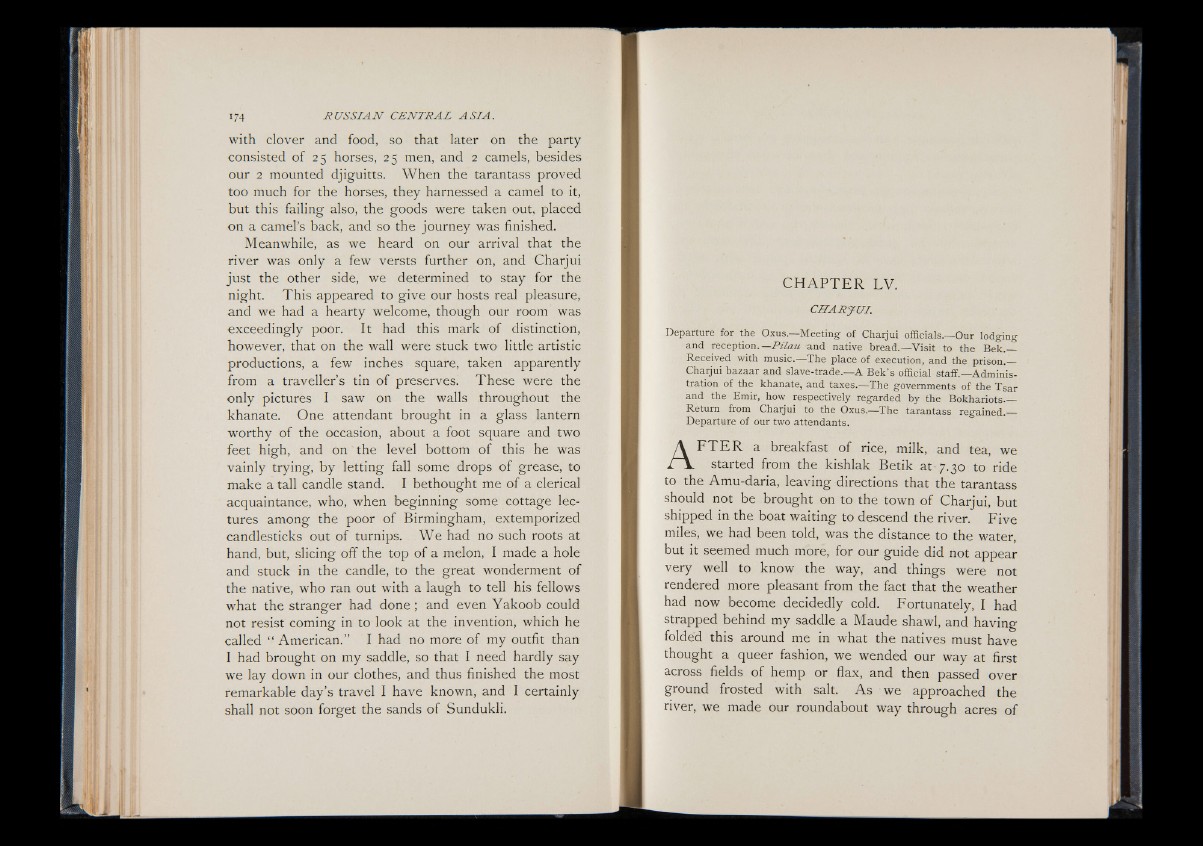
with clover and food, so that later on the party
consisted of 25 horses, 25 men, and 2 camels, besides
our 2 mounted djiguitts. When the tarantass proved
too much for the horses, they harnessed a camel to it,
but this failing also, the goods were taken out, placed
on a camel’s back, and so the journey was finished.
Meanwhile, as we heard on our arrival that the
river was only a few versts further on, and Charjui
just the other side, we determined to stay for the
night. This appeared to give our hosts real pleasure,
and we had a hearty welcome, though our room was
exceedingly poor. It had this mark of distinction,
however, that on the wall were stuck two little artistic
productions, a few inches square, taken apparently
from a traveller’s tin of preserves. These were the
only pictures I saw on the walls throughout the
khanate. One attendant brought in a glass lantern
worthy of the occasion, about a foot square and two
feet high, and on the level bottom of this he was
vainly trying, by letting fall some drops of grease, to
make a tall candle stand. I bethought me of a clerical
acquaintance, who, when beginning some cottage lectures
among the poor of Birmingham, extemporized
candlesticks out of turnips. W e had no such roots at
hand, but, slicing off the top of a melon, I made a hole
and stuck in the candle, to the great wonderment of
the native, who ran out with a laugh to tell his fellows
what the stranger had done; and even Yakoob could
not resist coming in to look at the invention, which he
called “ American.” I had no more of my outfit than
I had brought on my saddle, so that I need hardly say
we lay down in our clothes, and thus finished the most
remarkable day’s travel I have known, and I certainly
shall not soon forget the sands of Sundukli.
C H A P T E R LV.
CHARJUI.
Departure for the Oxus.—Meeting of Charjui officials.— Our lodging
and reception.—Pilau and native bread.—Visit to the Bek._
Received with music.—The place of execution, and the prison.—
Charjui bazaar and slave-trade.—A Bek’s official staff.—Administration
of the khanate, and taxes.—The governments of the Tsar
and the Emir, how respectively regarded by the Bokhariots.—
Return from Charjui to the Oxus.— The tarantass regained.—
Departure of our two attendants.
AF T E R a breakfast of rice, milk, and tea, we
started from the kishlak Betik a t-7.30 to ride
to the Amu-daria, leaving directions that the tarantass
should not be brought on to the town of Charjui, but
shipped in the boat waiting to descend the river. Five
miles, we had been told, was the distance to the water,
but it seemed much more, for our guide did not appear
very well to know the way, and things were not
rendered more pleasant from the fact that the weather
had now become decidedly cold. Fortunately, I had
strapped behind my saddle a Maude shawl, and having
folded this around me in what the natives must have
thought a queer fashion, we wended our way at first
across fields of hemp or flax, and then passed over
ground frosted with salt. A s we approached the
river, we made our roundabout way through acres of